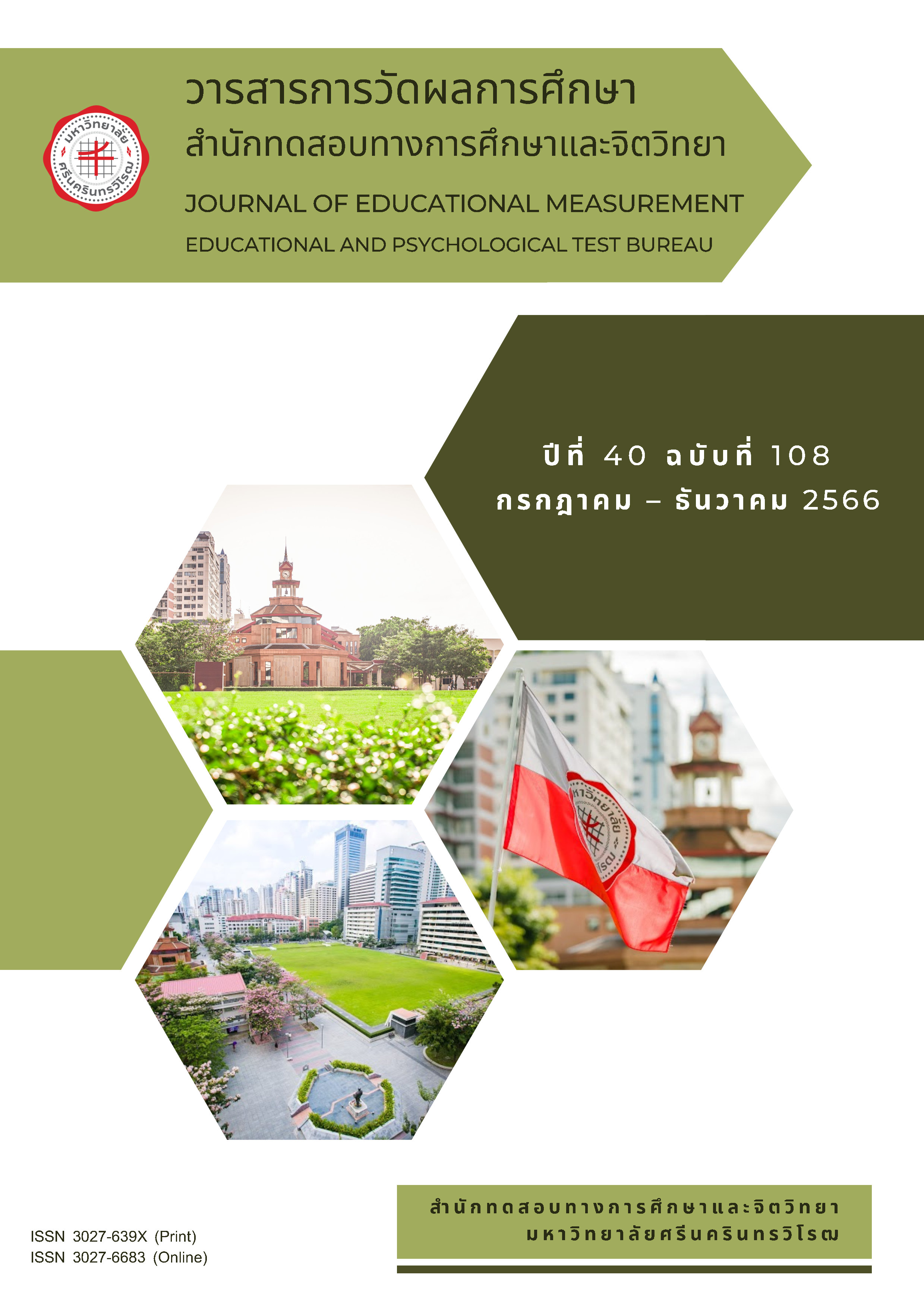ประสบการณ์การเลิกเสพติดเกม
คำสำคัญ:
ประสบการณ์, การเลิกเสพติดเกม, การวิเคราะห์เชิงปรากฎการณ์วิทยาแบบตีความบทคัดย่อ
ความสนใจทางการวิจัยส่วนใหญ่มุ่งไปยังประเด็นเกี่ยวกับการเสพติดเกม ส่วนการศึกษาในประเด็นเกี่ยวกับการเลิกเสพติดเกมยังคงมีอยู่อย่างจำกัด งานวิจัยนี้มุ่งศึกษาประสบการณ์การเลิกเสพติดเกมโดยใช้ระเบียบวิจัยเชิงคุณภาพ “การวิเคราะห์เชิงปรากฏการณ์วิทยาแบบตีความ” เก็บข้อมูลด้วยวิธีการสัมภาษณ์กึ่งโครงสร้างร่วมกับการวาดภาพกับผู้เข้าร่วมวิจัยจำนวน 5 คนที่มีประสบการณ์การเสพติดเกมและเลิกเสพติดเกมได้สำเร็จ ผลการวิจัยแสดงให้เห็นว่ากระบวนการเลิกเสพติดเกี่ยวเกมเกี่ยวข้องจุดเปลี่ยนที่สำคัญ 4 ประการดังนี้ 1) การรับรู้คุณค่าในตนเองต่ำ 2) ความมุ่งมั่นทำหน้าที่ตนเอง 3) ความต้องการปฏิสัมพันธ์จากบุคคลรอบข้าง และ 4) การบริหารเวลาชีวิตที่มีประสิทธิภาพ ข้อค้นพบจากการวิจัยนำไปสู่การระบุแนวทางการบำบัดที่เหมาะสมสำหรับการช่วยเหลือบุคคลในการเลิกเสพติดเกม
เอกสารอ้างอิง
กัณฐรัตน์ เหลืองอ่อน, อรพินทร์ ชูชม และนฤมล พระใหญ่. (2564). คุณลักษณะภูมิคุ้มกันทางจิตในการป้องกันการติดเกมในวัยรุ่น. วารสารสังคมศาสตร์และมานุษยวิทยาเชิงพุทธ, 6(6), 450-463.
ขวัญจิต เพ็งแป้น. (2560). การป้องกันปัญหาภาวะสุขภาพของเด็กติดเกมออนไลน์. วารสารราชธานีนวัตกรรมทางวิทยาศาสตร สุขภาพ, 1(1), 16-32.
ชมพูนุท ศรีจันทร์นิล. (2560). การวิเคราะห์เชิงปรากฎการณ์วิทยาแบบตีความ: ระเบียบวิธีวิจัยเชิงคุณภาพสำหรับการวิจัยทางด้านจิตวิทยา. วารสารศึกษาศาสตร์, 28(3), 1-13.
ชมพูนุท ศรีจันทร์นิล. (2562). การวิเคราะห์เชิงปรากฎการณ์วิทยาแบบตีความ: เกณฑ์ประเมินคุณภาพ. มนุษยศาสตร์สาร, 20(1), 189-213.
เทอดพงษ์ แตงไทย, เพ็ญนภา กุลนภาดล และประชา อินัง. (2564). ผลการปรึกษาทฤษฎีเล่าเรื่องต่อความเครียดเชิงวิชาการของนักเรียนมัธยมศึกษาตอนปลาย. วารสารการวัดผลการศึกษา, 38(103), 184-194.
ปภานันท์ ฟักเจริญ และปวีณา อ่อนใจเอื้อ. (2564). ผลของการใช้กิจกรรมแนะแนวตามขั้นตอนการคิดวิเคราะห์เพื่อส่งเสริมการรู้เท่าทันสื่อสังคมออนไลน์ของนักเรียนชั้นมัธยมศึกษาปีที่ 2 โรงเรียนสตรีวิทยา 2 ในพระราชูปถัมภ์สมเด็จพระศรีนครินทราบรมราชชนนี. วารสารการวัดผลการศึกษา, 38(104), 95-105.
Altintas, E., Karaca, Y., Hullaert, T., & Tassi, P. (2019). Sleep quality and video game playing: Effect of intensity of video game playing and mental health. Psychiatry research, 273, 487-492.
Apisitwasana, N., Perngparn, U., & Cottler, L. B. (2018). Effectiveness of school-and family-based interventions to prevent gaming addiction among grades 4–5 students in Bangkok, Thailand. Psychology research and behavior management, 11, 103.
American Psychiatric Association, D. S., & American Psychiatric Association. (2013). Diagnostic and statistical manual of mental disorders: DSM-5 (Vol. 5). American psychiatric association.
Faust, K. A., & Prochaska, J. J. (2018). Internet gaming disorder: A sign of the times, or time for our attention?.
Jeong, E. J., Kim, D. J., & Lee, D. M. (2017). Why do some people become addicted to digital games more easily? A study of digital game addiction from a psychosocial health perspective.International Journal of Human–Computer Interaction, 33(3), 199-214.
Jiang, Q. (2018). Off the hook: Exploring reasons for quitting playing online games in China. Social Behavior and Personality: an international journal, 46(12), 2097-2112.
King, D. L., & Delfabbro, P. H. (2020). Video game addiction. In Adolescent Addiction (pp. 185-213). cademic Press.
Kvale, S., & Brinkmann, S. (2009). Interviews: Learning the craft of qualitative research interviewing. sage.
Lam, L. T. (2014). Internet gaming addiction, problematic use of the internet, and sleep problems: a systematic review. Current psychiatry reports, 16(4), 1-9.
Law, F. M., & Guo, G. J. (2015). The impact of reality therapy on self-efficacy for substance-involved female offenders in Taiwan. International journal of offender therapy and comparative criminology, 59(6), 631-653.
Männikkö, N., Ruotsalainen, H., Miettunen, J., Pontes, H. M., & Kääriäinen, M. (2020). Problematic gaming behaviour and health-related outcomes: A systematic review and meta-analysis. Journal of Health Psychology, 25(1), 67-81.
Pelletier, V. H., Lessard, A., Piché, F., Tétreau, C., & Descarreaux, M. (2020). Video games and their associations with physical health: a scoping review. BMJ open sport & exercise medicine, 6(1), e000832.
Pietkiewicz, I., Smith, J. A. (2014). A practical guide to using interpretative phenomenological analysis in qualitative research psychology. Psychological journal, 20(1), 7-14.
Prochaska, J. O., & Velicer, W. F. (1997). The transtheoretical model of health behavior change. American journal of health promotion, 12(1), 38-48.
Rosidi, R., Sutoyo, A., & Purwanto, E. (2018). Effectiveness of reality therapy group counseling to increase the self-esteem of students. Jurnal Bimbingan Konseling, 7(1), 12-16.
Sookpiam, M., & Viriyapong, R. (2018). Modeling the effects of education campaign on online game addiction of children and youth in Thailand. International Journal of Science, 15(1), 15-24.
Taechoyotin, P., Tongrod, P., Thaweerungruangkul, T., Towattananon, N., Teekapakvisit, P., Aksornpusitpong, C., ... & Piyaraj, P. (2020). Prevalence and associated factors of internet gaming disorder among secondary school students in rural community, Thailand: A cross-sectional study. BMC research notes, 13(1), 1-7.
Wang, J. L., Sheng, J. R., & Wang, H. Z. (2019). The association between mobile game addiction and depression, social anxiety, and loneliness. Frontiers in public health, 247.
Wölfling, K., Müller, K. W., Dreier, M., Ruckes, C., Deuster, O., Batra, A., ... & Beutel, M. E. (2019). Efficacy of short-term treatment of internet and computer game addiction: A randomized clinical trial. JAMA psychiatry, 76(10), 1018-1025.



